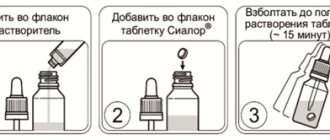Release form, packaging and composition of the drug Clinical-pharmacological group Pharmaco-therapeutic group Pharmacological action Indications for use Method of administration and doses Side effects Contraindications for use Use in children Special instructions Drug interactions
Registration Certificate Holder:
COMPANY DECO, LLC (Russia)
ATX Code:
L03AX
Active substance:
Dosage form:
Tamerite
| The drug is available with a prescription | Tamerite | Powder for preparation. solution for intramuscular injection 100 mg: vial. 1 PC. reg. No.: LS-001427 from 03/17/06 - Cancellation of State. registration |
pharmachologic effect
5-amino-1,2,3,4-tetrahydrophthalazine-1,4-dione sodium salt.
An immunostimulating agent, it also has an anti-inflammatory effect. Suppresses (reversibly, for 6-8 hours) the hyperactivity of macrophages, reduces excessive synthesis of TNF, interleukin 1, production of reactive oxygen species and other acute-phase proteins responsible for the development of toxic and diarrheal syndrome. Normalizes the functional state of macrophages, leads to the restoration of their antigen-presenting and regulatory functions. By increasing the functional antibacterial activity of neutrophil granulocytes, it enhances phagocytosis and increases the body’s nonspecific defense.
Instructions
The mechanism of action of the drug is associated with its ability to regulate the functional and metabolic activity of innate and adaptive immune cells (monocytes, macrophages, neutrophils, natural killer cells). Tamerite normalizes the phagocytic activity of monocytes/macrophages, the bactericidal activity of neutrophils and the cytotoxic activity of natural killer cells. At the same time, by restoring the reduced activity of innate and adaptive immune cells, the drug increases the body’s resistance to infectious diseases of bacterial, viral and fungal etiology, promotes faster elimination of the pathogen from the body, and reduces the frequency, severity and duration of infections.
In addition, Tamerit normalizes antibody formation, increases the functional activity (affinity) of antibodies, and indirectly regulates the production of endogenous interferons (IFN-α, IFN-γ) by producing cells.
In inflammatory diseases, the drug reversibly inhibits for 6-8 hours the excessive synthesis of tumor necrosis factor-α, interleukin-1, interleukin-6 and other pro-inflammatory cytokines by hyperactivated macrophages, the level of which determines the degree of inflammatory reactions, their cyclicity, as well as the severity of intoxication of the body. Tamerite reduces the production of reactive oxygen species by hyperactivated macrophages, thereby reducing the level of oxidative stress and protecting tissues and organs from the destructive effects of radicals. Normalization of excessively increased functional activity of phagocytic cells leads to the restoration of their antigen-presenting and regulatory functions, and a decrease in the level of autoaggression.
The drug is well tolerated and has no allergenic, mutagenic, embryotoxic, teratogenic or carcinogenic effects.
Pharmacokinetics
It is excreted from the body mainly through the kidneys. After intramuscular injection, the half-life is 30-40 minutes. The main pharmacological effects are observed within 72 hours.
Indications for use
peptic ulcer of the stomach and duodenum;
viral hepatitis;
chronic recurrent diseases caused by the herpes virus;
diseases caused by the human papillomavirus;
infectious and inflammatory urogenital diseases (urethritis of chlamydial and trichomonas etiology, chlamydial prostatitis, acute and chronic salpingoophoritis, endometritis);
purulent-inflammatory diseases of the pelvic organs;
postoperative rehabilitation of patients with uterine fibroids;
complications of the postoperative period in women of reproductive age;
postoperative purulent-septic complications and their prevention (including in cancer patients);
chronic recurrent furunculosis, erysipelas;
asthenic conditions, neurotic and somatoform disorders, decreased physical performance (including in athletes); mental, behavioral and post-withdrawal disorders in alcohol and drug addiction;
inflammatory diseases of the mucous membrane of the mouth and throat, periodontal diseases.
In adults and adolescents over 12 years of age in monotherapy:
As an immunomodulatory and anti-inflammatory agent in the complex therapy of immunodeficiency conditions in adults and adolescents from 12 years of age:
acute and chronic infectious and inflammatory diseases of the gastrointestinal tract, accompanied by intoxication and/or diarrhea;
chronic urogenital infections, including when carrying out immunorehabilitation measures during the inter-relapse period in order to maintain clinical remission.
As an immunomodulatory and anti-inflammatory agent in the complex therapy of immunodeficiency conditions in children over 6 years of age:
purulent surgical diseases (burn lesions, recurrent furunculosis, chronic osteomyelitis, gangrenous appendicitis with omentitis, peritonitis, purulent pleurisy);
frequent recurrent diseases of the respiratory tract and ENT organs of bacterial and viral etiology (frequent ARVI, bronchitis, pneumonia, chronic tonsillitis, chronic otitis media, chronic adenoiditis).
Contraindications
Individual intolerance; pregnancy and breastfeeding; children under 6 years of age (no clinical experience of use).
Carefully
No information available.
Use during pregnancy and breastfeeding
Contraindicated during pregnancy and breastfeeding.
Directions for use and doses
Intramuscularly. Before administration, the drug is diluted in 2-3 ml of water for injection or 0.9% sodium chloride solution. Methods of application, doses and duration of use are selected by the doctor depending on the diagnosis, severity of the disease, and age of the patient.
Directions for use and doses
The method of administration and dosage regimen of a particular drug depend on its release form and other factors. The optimal dosage regimen is determined by the doctor. The compliance of the dosage form of a particular drug with the indications for use and dosage regimen should be strictly observed.
IM, rectally, in the acute period of the disease, the initial dose is 0.2 g, then 0.1 g 2-3 times a day (every 4-6 hours); for chronic diseases
- 0.1 g 2 times a day (every 6-8 hours) until symptoms of intoxication and/or diarrhea disappear. The course of treatment is up to 10 days.
Chronic recurrent herpes virus infection
- rectally, 0.1 g daily for 20 days,
postoperative purulent-septic complications
- 0.1 g every other day, course - 15-20 suppositories.
Before administration, the powder is diluted in a bottle with 2-3 ml of water or 0.9% NaCl solution in compliance with aseptic requirements.
Similar drugs:
- Groprinosin Oral tablets
- Choludexan Capsule
- Lactobacterin siccum dry (Lactobacterin siccum) Lyophilisate for the preparation of solution for oral administration
- Wobenzym Oral tablets
- Anaferon for children (Anaferon filios) Lozenges
- Ursosan Capsule
- Bifidumbacterin Capsule
- Immunoflazidum (IMMUNOFLAZIDUM) Syrup
- Isoprinosine Oral tablets
- Derinat Solution for injection
** The Drug Directory is intended for informational purposes only. For more complete information, please refer to the manufacturer's instructions. Do not self-medicate; Before starting to use the drug Tamerit, you should consult a doctor. EUROLAB is not responsible for the consequences caused by the use of information posted on the portal. Any information on the site does not replace medical advice and cannot serve as a guarantee of the positive effect of the drug.
Are you interested in the drug Tamerit? Do you want to know more detailed information or do you need a doctor's examination? Or do you need an inspection? You can make an appointment with a doctor - the Euro lab is always at your service! The best doctors will examine you, advise you, provide the necessary assistance and make a diagnosis. You can also call a doctor at home . Euro lab clinic is open for you around the clock.
** Attention! The information presented in this medication guide is intended for medical professionals and should not be used as a basis for self-medication. The description of the drug Tamerit is provided for informational purposes and is not intended for prescribing treatment without the participation of a doctor. Patients need to consult a specialist!
If you are interested in any other drugs and medications, their descriptions and instructions for use, information about the composition and form of release, indications for use and side effects, methods of use, prices and reviews of drugs, or you have any other questions and suggestions - write to us, we will definitely try to help you.
TAMERON® (Tameron)
Intramuscularly. Before administration, the drug is diluted in 2 ml of water for injection or 0.9% sodium chloride solution. Methods of application, doses and duration of use are selected by the doctor depending on the diagnosis, severity of the disease, and age of the patient.
- peptic ulcer of the stomach and duodenum in the acute period: 2 days, 200 mg once a day, then 100 mg at intervals of 72 hours. A course of 15-25 injections. In the chronic period: 5 days, 100 mg once a day, then 100 mg every 72 hours. Course of 20 injections.
— viral hepatitis: the initial dose is 200 mg once, then 100 mg 2 times a day until the symptoms of intoxication and inflammation subside. Subsequent continuation of the course of 100 mg at intervals of 72 hours. A course of 20-25 injections.
- chronic recurrent diseases caused by the herpes virus: 100 mg daily for 5 injections, then 100 mg every other day for 15 injections.
- diseases caused by the papilloma virus: 5 days, 100 mg once a day, then 100 mg every other day, 15 injections. Course - 20 injections.
- urogenital diseases: urethritis of chlamydial and trichomonas etiology, chlamydial prostatitis: 1 day 100 mg twice, then 100 mg every other day. A course of 10-15 injections (depending on the severity of the pathological process).
- salpingoophoritis, endometritis in the acute period for 2 days, 200 mg once a day, then 100 mg at intervals of 72 hours. The duration of use depends on the severity of the disease. There are a total of 20 injections per course. In the chronic period - 5 days, 100 mg once a day, then 100 mg every 72 hours. Course of 20 injections.
- acute and chronic purulent diseases of the pelvic organs: in the acute period, 1 day 200 mg once, 3 days 100 mg daily, then 100 mg every other day 5 injections. Course of 10 injections. In the chronic period - 5 days, 100 mg once a day, then 100 mg every 72 hours. Course - 20 injections.
— postoperative rehabilitation of patients with uterine fibroids and complications of the postoperative period in women of reproductive age: 5 days, 100 mg once a day, then 100 mg every other day. Course - 15 injections.
- prevention and treatment of postoperative infectious complications in the pre- and postoperative period (including in cancer patients): 100 mg 1 time per day 5 injections before surgery, 100 mg every other day 5 injections after surgery and 100 mg every 72 hours 5 injections. For severe disease, the initial dose is 200 mg once or 100 mg 2 times a day. Course - 20 injections. - chronic recurrent furunculosis, erysipelas: 5 days, 100 mg once a day, then 100 mg every other day. Course of 20 injections.
- asthenic conditions, neurotic and somatoform disorders, mental, behavioral and post-withdrawal disorders, in patients with alcohol and drug addiction: 5 days, 100 mg daily, then 100 mg 1 time with an interval of 72 hours. A course of 15-20 injections.
To increase physical performance: 100 mg every other day - 5 injections, then 100 mg every 72 hours, course up to 20 injections.
- inflammatory diseases of the mucous membrane of the mouth and throat, periodontal diseases: initial dose of 100 mg daily for 5 injections, then 100 mg at intervals of 72 hours. Course of 15 injections.
Adults and adolescents over 12 years of age in monotherapy:
- acute and chronic infectious and inflammatory diseases of the gastrointestinal tract, accompanied by intoxication and/or diarrhea: 200 mg once, then 100 mg 2 times a day until the symptoms of intoxication subside. It is possible to subsequently continue the course of 100 mg 1 time with an interval of 72 hours. A course of 20-25 injections.
- chronic urogenital infections, including when carrying out immunorehabilitation measures during the inter-relapse period in order to maintain clinical remission: 100 mg every other day for a course of 10 injections.
Children over 6 years old:
- purulent surgical diseases (burn lesions, recurrent furunculosis, chronic osteomyelitis, gangrenous appendicitis with omentitis, peritonitis, purulent pleurisy):
children from 6 to 11 years old
one injection of 50 mg daily for 5 days, then one injection of 50 mg every other day for 10-15 days. Course 10-15 injections;
children aged 12-18 years
- treatment is carried out according to the same scheme in the form of intramuscular injections of 100 mg.
— for dressings, it is desirable to use Tameron externally in the form of dressings with sterile wipes moistened with a 1% solution of Tameron in water for injection (in dressings with mash or water-soluble ointment dressings).
- with frequent recurrent diseases of the respiratory tract and JIOP organs of bacterial and viral etiology (frequent ARVI, bronchitis, pneumonia, chronic tonsillitis, chronic otitis, chronic adenoiditis):
children from 6 to 11 years old: one injection of 50 mg daily for 5 days, then 50 mg once a day every other day for 10-15 days. A course of 10-15 injections.
Children aged 12-18 years - treatment according to the same regimen in the form of intramuscular injections of 100 mg.





